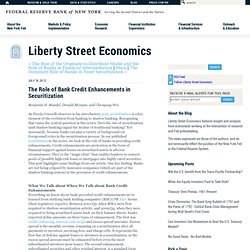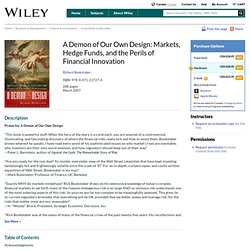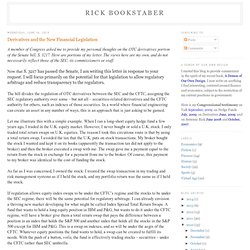

Structured Finance and Collateralized Debt Obligations: New Developments in Cash and Synthetic Securitization, 2nd Edition. The Role of Bank Credit Enhancements in Securitization. Benjamin H.

Mandel, Donald Morgan, and Chenyang Wei As Nicola Cetorelli observes in his introductory post, securitization is a key element of the evolution from banking to shadow banking. Recognizing that raises the central question in this series: Does the rise of securitization (and shadow banking) signal the decline of traditional banking? Not necessarily, because banks can play a variety of background (or foreground) roles in the securitization process. In our published contribution to the series, we look at the role of banks in providing credit enhancements. What We Talk about When We Talk about Bank Credit EnhancementsEverything we know about bank-provided credit enhancements we’ve learned from studying bank holding companies’ (BHCs) FR Y9-C forms (their regulatory reports).
So how much in enhancements did BHCs provide over the window for which we have data? Derivative Concentration Threaten Global Economy. Derivatives Ownership Even More Concentrated Than Ever As I noted in 2009, 5 banks held 80% of America’s derivatives risk.

Since then, the percent of derivatives held by the top 5 banks has only increased. As Tyler Durden notes:
What are MBSs? What is a CDO? What is a CDS? A Demon of Our Own Design: Markets, Hedge Funds, and the Perils of Financial Innovation. "A risk-management maven who's been on Wall Street for decades…Bookstaber's book shows us some complex strategies that very smart people followed to seemingly reduce risk—but that led to huge losses.

" (Newsweek) "Mr. Bookstaber is one of Wall Street's 'rocket scientists'--mathematicians lured from academia to help create both complex financial instruments and new computer models for making investing decisions. In the book, he makes a simple point: The turmoil in the financial markets today comes less from changes in the economy--economic growth, for example, is half as volatile as it was 50 years ago--and more from some of the financial instruments (derivatives) that were designed to control risk. " Derivatives and the New Financial Legislation. A member of Congress asked me to provide my personal thoughts on the OTC derivatives portion of the Senate bill, S. 3217.

Here are portions of my letter. The views here are my own, and do not necessarily reflect those of the SEC, its commissioners or staff. Now that S. 3217 has passed the Senate, I am writing this letter in response to your request. I will focus primarily on the potential for that legislation to allow regulatory arbitrage and reduce transparency to the regulators. The bill divides the regulation of OTC derivatives between the SEC and the CFTC, assigning the SEC regulatory authority over some – but not all – securities-related derivatives and the CFTC authority for others, such as indexes of those securities. Let me illustrate this with a simple example. As far as I was concerned, I owned the stock: I treated the swap transaction in my trading and risk management systems as if I held the stock, and my portfolio return was the same as if I held the stock. Gillian Tett Exhibits Undue Faith in Data and Models. I hate beating up on Gillian Tett, because even a writer is clever as she is is ultimately no better than her sources, and she seems to be spending too much time with the wrong sort of technocrats.

Her latest piece correctly decries the fact that no one has the foggiest idea of what might have happened if Greece defaulted (note that we are likely to revisit this issue in the not-too-distant future). But she makes the mistake of assuming the problem could have been solved (in the mathematical sense, that the outcome could have been predicted with some precision) by having better data. That is a considerable and unwarranted logical leap: Today banks and other financial institutions are filing far more detailed reports on those repo and credit derivatives trades, and regulators are exchanging that information between themselves. And Tett’s focus on “data”, no doubt reflecting the preoccupation of the officialdom, is a big tell.
ISDA: Suckers Wanted. “The International Swaps and Derivatives Association said on Thursday that based on current evidence the Greek bailout would not prompt payments on the credit default swaps.”

Here is a question for the crowd: Exactly how brain damaged, foolish and stupid must a trader be to ever buy one of these embarrassingly laughable instruments called derivatives? The claim that Greece has not defaulted — despite refusing to make good on their obligations in full or on time — is utterly laughable. In order to get paid on a default, you need a committee to evaluate whether or not failing to make payments is a — WTF?!? — default? Even more ridiculous, the committee is composed of biased, interested parties with positions in the aforementioned securities? ISDA: After this shitshow, why on earth would anyone EVER want to own an asset class that requires you to determine payout? Category: Derivatives, Really, really bad calls.